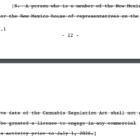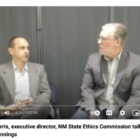Ethics
Lawmakers for second year kick ethics fixes down the road
|
An effort to fix the state’s anti-corruption statute after the New Mexico Supreme Court barred prosecutors from bringing criminal charges under several of its provisions died in the state Senate. The legislation languished in a committee after clearing the House 66-0 with two weeks to go in the legislative session, which ended at noon today.
Gov. Michelle Lujan Grisham greenlighted the effort to fix the ethics law as the session kicked off in January. House Bill 8, sponsored by Rep. Kathleen Cates, D-Rio Rancho, would have fixed the Governmental Conduct Act, which provides standards for ethical conduct on the part of public officials, employees of state or local agencies, and lawmakers.
The New Mexico Supreme Court ruled that three of the statute’s four provisions used by prosecutors were too vaguely written to result in criminal charges.
Justices considered the statute in a consolidated case involving a county treasurer who offered money to an employee for sex; a district attorney who used her position to intimidate officers investigating her use of a public vehicle for personal reasons; a judge who illegally recorded private conversations in a courthouse; and a state cabinet secretary who used her position to access the tax records of a previous employer. In the latter case, prosecutors alleged she was trying to prevent an audit of that employer because she had embezzled money from them. (Her embezzlement conviction was later overturned on appeal with the court saying the statute of limitations had run out.)
After the Supreme Court ruling, prosecutors couldn’t criminally charge these public officials for state ethics violations.
The proposed fixes to the ethics law included barring partisan political activity while on duty or undertaking it in a way that uses public resources.






